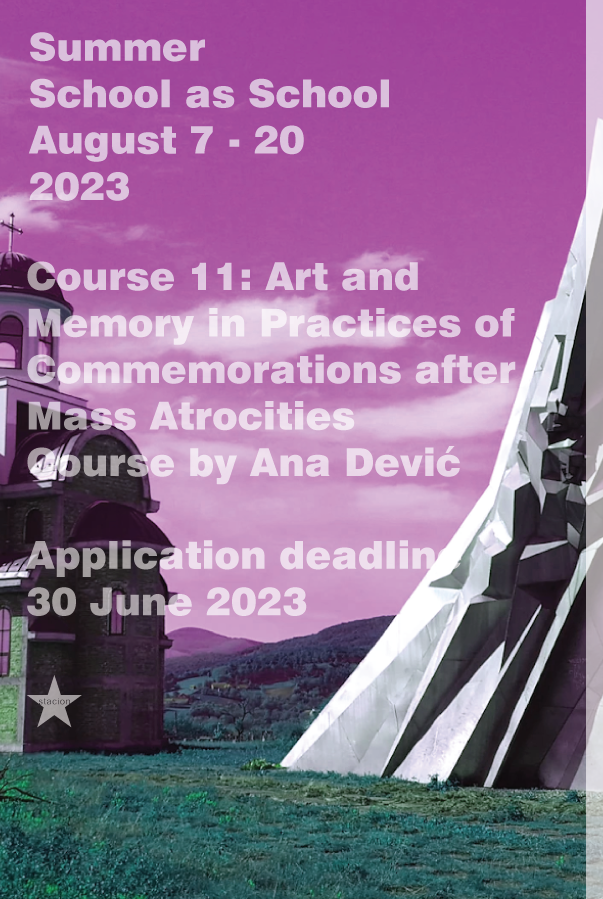
Course 11: Art and Memory in Practices of Commemorations after Mass Atrocities
Course by Ana Dević
14 - 19 August 2023
Course Level BA/MA
3 ECTS
Course Description
What role do commemorations play in the construction of collective memory in places afflicted by extreme war violence? How do different forms of commemoration create or hinder inclusive remembrance of the violent past? What happens, for example, when a village cinema theatre becomes a place of torture and detention, and is then abandoned, keeping the traces of extreme violence and yielding only traumatic memories? The course investigates how such memories can be re-integrated within the social life through commemorative practices, zooming in on several sites of extreme war atrocity in the post-Yugoslav spaces, and focusing on artistic and performative memory activism - the visually striking, also virtual tools of approaching memory, focusing on artists and citizens-viewers as actors, on communal and broader mobilizations, and significance in reclaiming spaces of war atrocities as inclusive places of memory. With the specific post-Yugoslav focus, the course will be placed in a comparative context, discussing conflicting memory-scapes of extreme atrocities in Europe and elsewhere.
The course creates, first, a “conflicting map” of memorializations, where the dominant/ official commemorations of mass atrocities, which exclude significant portions of the community, are juxtaposed to the grassroots commemorative practices seeking inclusive forms of remembrance.
Deriving from the overall aim, the course’s specific objectives are:
1. To explore the connection between sites of commemoration, the construction of collective memory (and collective denial), and (the lack of) durable peace in places that have been disrupted by violent conflict. The following sites of war atrocities and commemorations in Bosnia-Herzegovina, Serbia, Croatia and Kosovo are selected/ not limited to: Srebrenica, Prijedor, Vukovar, Knin, Jasenovac, Batajnica, and Suharekë.
2. To map to what extent and by which mechanisms local voices and grassroots perspectives are incorporated into, or excluded from, the identified competing official versions of remembrance/ to analyze the (conflicting) politicizations surrounding the selected sites of memory.
3. Investigating how different media provide testimony/ witnessing the acts of atrocities: the methods, ethical aspects, and usefulness of various visual methods/ techniques; the (im)possibilities of representation after war violence and extreme atrocities (esp. those internationally managed after the events).
4. To critically analyse the universal human rights regimes as the (sole successful?) endeavour for justice following mass/ war atrocities.
Biography
Ana Dević is an associate professor of political and cultural sociology who obtained her Ph.D. from the University of California at San Diego and her master degree at the Institute of Social Studies in The Hague. She is currently a senior researcher at KU Leuven, where she was previously a Marie Sklodowska-Curie fellow. Ana is also an adjunct associate professor with the University of Bologna Eastern and Southeast European Studies, teaching there a master course on the Yugoslav and post-Yugoslav cinema. With the course on Soviet and post-Soviet history read through film and popular culture, she regularly contributes to the summer term teaching at Boğaziçi university in Istanbul. Ana specializes in nationalism, intellectuals, social movements, gender, memory politics and arts. Her recent publications include “Artefacts of national subversion: the flag as a critical presence or a disturbing absence in contemporary visual art“ (2023, with P. Vermeersch), ''Class, Conflict, and Power between Hegemony and Critical Knowledge” (2022), and “Hijacked Feminism of the New Right“ (2021). With the two recently won grants, she is embarking on the project dealing with the artistic-activist commemorations of mass atrocities in the post Yugoslav space.
Participation
15 participants will be selected to participate in this course. Eligible participants must read the Terms, fill out the application form, upload the required documents and submit the application form. Incomplete applications will not be considered.
The conditions and registration fees
Enrollment fee 1 - 370 euros for self-paying students, with the offer of accommodation in student residences.
Enrollment fee 2 - 570 euros for institutionally sponsored students, with the offer of accommodation in student residences.
Special conditions apply for alumni of the Summer School as School.
Scholarships are available for students from Kosovo.
Payment must be made after successful application.
Late applications may be accepted until July 22, 2023.